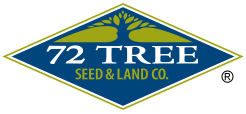Notice: Undefined variable: page in /home/vrxdg1855sn3/public_html/wp-content/themes/72tree/content.php on line 15
Notice: Trying to get property 'ID' of non-object in /home/vrxdg1855sn3/public_html/wp-content/themes/72tree/content.php on line 15
Preventing and Eliminating Christmas Tree Bugs
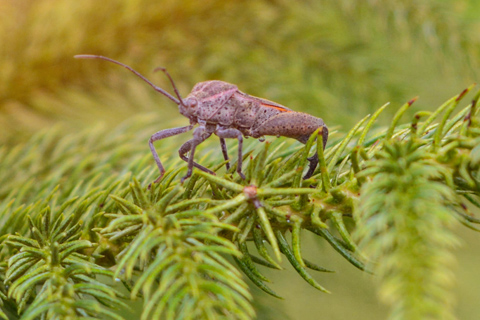
The Christmas tree is the pinnacle of holiday decorating but can also be a nightmare when bugs hitch a ride on the tree into your home.
Infested Christmas trees present a series of problems for the homes and neighborhoods they decorate. Pest control and prevention are essential measures when putting up a live tree for the holidays.
72tree.com collected information on the bugs that can be found on Christmas trees, how to prevent the buying of an infested tree, eliminating any insects found on the tree, and how to properly dispose of the tree.
Bugs on Christmas Trees
When you go to your local Christmas tree lot, keep in mind that just a few days prior, those trees were cut down from a Christmas tree farm or a forest.
Insects may have nested in or laid eggs on these trees. The following are some of the insect species you may encounter living or hatching in your Christmas tree:
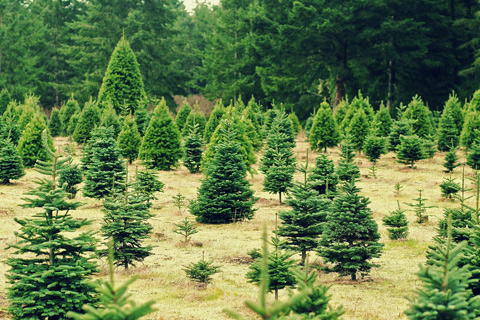
• Aphids
• Spiders
• Bark Beetles
• Mites
• Scale
• Needle Scale
• Mantises
• Spotted Lanternflies
• Sawfly
• Adelgids
• Stink Bugs
Note: Store-bought wreaths and swags made from live tree stems may travel thousands of miles from where they originated (potentially exposing your ecosystem to a new or invasive insect species). During the manufacturing and packing processes, bugs and the eggs they lay can easily be overlooked.
How To Prevent Bugs on your Christmas Tree
You can prevent bringing bugs into your home on a Christmas tree by following a few easy steps:

Right Time to Shop – Do not shop for a Christmas tree at night. It is easier to spot insects and eggs during the daytime.
Inspect the Under Side of Branches – Lay the tree down and get an up-close look at the underside of the branches and the trunk. Pay particular attention to the lower branches. You are looking for:
• Visible Insects
• Red or Brown Dots (Mites)
• Clusters of Eggs (Mantises and Lanternflies)
• What Appear to Be Snowflakes (Adelgids)
• White or Red Dots on Needles (Scale)
• Brown Cocoons (Sawfly)
• Small Holes in Trunk (Bark Beetle)
• Sawdust Trails (Bark Beetle)
Let It Stand – Attach the base and let the tree stand in the garage for a day or two. As a preventative measure, apply neem oil or insecticidal soap to the tree before moving it inside and decorating it.
How To Get Rid of Christmas Tree Insects
One of the most common insects found on Christmas trees is aphids. Killing aphids and other insects can be accomplished by spraying the tree with non-toxic neem oil or a homemade insecticidal soaps. Read more about killing aphids.
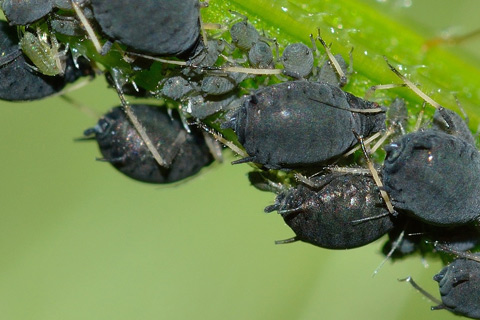
For the most part, newly hatched insects and spiders quickly expire from desiccation (they dry out). However, there are those that do survive.
Beetles, mantises, spotted lanternflies, and sawflies can leave the tree and potentially make their way outside. Again, the application of neem oil and insecticidal soap can be used to control these insects.
If you spot insects or eggs on your tree, DO NOT use commercial aerosol bug sprays. There is no necessity to expose yourself and your loved ones to these harsh chemicals. And, as many of them are flammable, you risk having the tree and your home go up in flames.
For pests that have fallen to the floor or are on your furniture, avoid stepping on them or crushing them (they can leave stains, and some insects have a putrid smell).
Use a vacuum cleaner that doesn’t have a beater bar to suck them up. Then treat the bag or the receptacle with neem oil or insecticidal soap before disposing of them.
How To Dispose of a Christmas Tree
To help preserve the ecosystem in your region, avoid placing the used tree on brush piles or compost heaps. Invasive insects and diseases are able to escape into landscapes and neighboring forests, becoming established, and upsetting the native ecosystem.
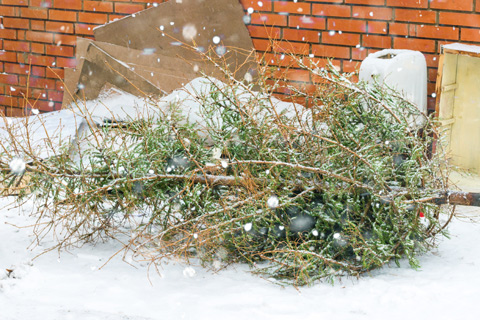
When you take steps to properly purchase, treat, and dispose of a Christmas tree, these risks are dramatically reduced.
Many municipalities and counties nationwide have pickup programs established to retrieve your tree at curbside and properly dispose of it.
If you miss this service or it isn’t available, you can take the tree to a solid waste facility, dump, or landfill. This will keep any pests that may remain in the tree from spreading.
Bug-Free Christmas Tree for the Holiday Season
An infested Christmas tree inside your home probably wasn’t on your wish-list for this holiday season. When bugs hitch a ride into your home, you need to know how to handle them efficiently.
From this article, you have discovered which bugs can be found on a Christmas tree, what to look for when purchasing the tree, how to eliminate any bugs on the tree, and how to properly dispose of the tree once the season is over.
Your home, neighborhood, and neighboring forest are all at risk when the poor management of a Christmas tree infestation allows foreign or invasive insects to disrupt a native ecosystem. Pest control and prevention should be one of the main concerns of a live tree in your home for the holidays.
Sources:
https://hortnews.extension.iastate.edu/insects-christmas-trees
https://christmastrees.ces.ncsu.edu/badbugs/
https://extension.unh.edu/resources/files/resource000986_rep2299.pdf
https://aces.nmsu.edu/ces/yard/2000/122300.html
Notice: Undefined variable: page in /home/vrxdg1855sn3/public_html/wp-content/themes/72tree/content.php on line 15
Notice: Trying to get property 'ID' of non-object in /home/vrxdg1855sn3/public_html/wp-content/themes/72tree/content.php on line 15
Killing Aphids
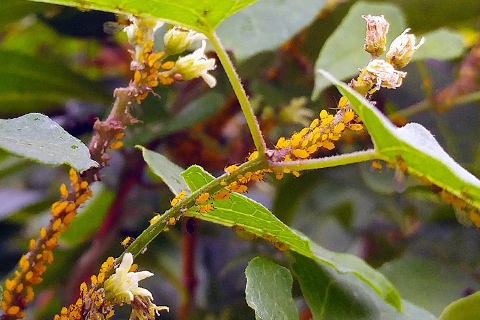
Disgusting aphids are a severe problem that can destroy your landscape. During an infestation, what appears to be a black tar on your foliage is actually a fungus growing in aphid excrement. The more of this you see, the bigger your problem is.
Aphids can cause the eventual death of your plants and trees, both indoors and outdoors. Upon detection of an infestation, treatment should begin immediately, and only end when all signs of the pest are gone.
In this article, 72tree.com answers some common aphid questions, and offers three easy methods to control them.
How to Get Rid of Aphids
Getting rid of your aphid problem starts with observing how big of a problem you have, determining which actions to take, and following up to ensure the problem is over.
Observation – In many aphid infestations, you may notice the presence of ants. These ants are not attacking the aphids, they are cultivating the honeydew excrement which they produce.
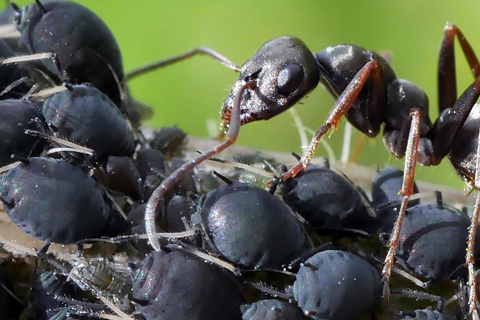
If this is the case, locate the ant trail(s) and treat the ant problem simultaneously with the aphid problem. You will see below that these three treatments work well for both insects.
Action – The following are 3 simple solutions that eliminate aphids without the use of commercial insecticides.
1 – Insecticidal Soap – The ingredients are:
• Liquid dishwashing soap (Dawn, Ivory, etc. but not the special formula varieties)
• Vegetable oil (corn, canola, sunflower, etc.)
• Warm water (filtered or soft water)
Step 1 – Mix 1/2 cup of vegetable oil with 3 Tbsp of dishwashing soap in a measuring cup and mix well.
Step 2 – Pour the mix into an empty (clean) gallon container and fill it halfway with warm water.
Step 3 – Shake the mixture well and fill a spray bottle with it. Keep the remainder of the mixture in a cool, dry place until the next use.
Application – In the early morning or late afternoon, spray the mixture directly on the aphids and ants (if present), you will also spray the area around the infestation, and along the ant trails.
Apply the mixture weekly in the same way for three weeks, or until the pests are eliminated.
2 – Neem Oil – Neem oil is a pungent vegetable oil derived from the fruit and seeds of an evergreen tree called Neem.
Pure Neem oil can be purchased at your local gardening center and comes ready for use.
Application – Again, in the early morning or late afternoon, spray the oil directly on the aphids and surrounding areas.
When sprayed along ant trails, Neem oil is very effective in repelling many species of ants. This is accomplished by disrupting the pheromone trails ants leave for others to follow.
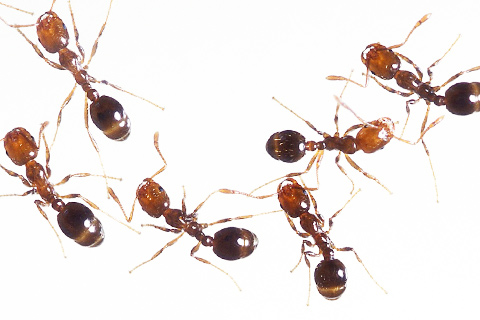
Apply on a weekly basis until the ants and aphids are no longer visible.
3 – Vinegar Spray – The ingredients are:
• Vinegar (white or apple cider)
• Water
Step 1 – Mix equal parts of vinegar and water together in a spray bottle.
Application – In the early morning or late afternoon, spray the water and vinegar mixture directly on the infestation and surrounding area.
When sprayed in the affected area and along the ant trail, this solution works well to repel the ants and disrupt their pheromone trail.
Apply weekly until the infestation has been eliminated.
For treating other insect infestations, visit this link https://www.72tree.com/using-dormant-horticultural-oil-treat-tree-insect-infestations/
People Also Ask
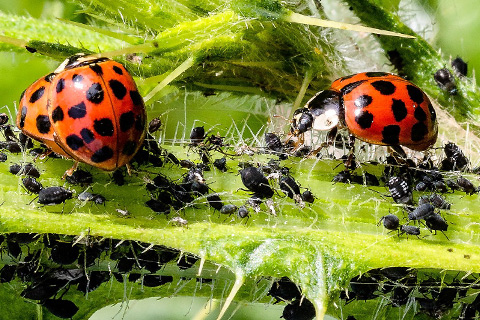
Q: Why Do You Apply Insecticides in the Morning?
A: Insecticides and insect deterrents are applied in the early morning or late afternoon to avoid overheating the foliage in direct sunlight.
Q: How Long is the Life of an Aphid?
A: Depending on the species and environment, aphids live from one week to forty days.
Q: How Long Do Aphid Infestations Last?
A: As aphids are able to reproduce rapidly, infestations can occur relatively quickly and may last until the death of the host (without treatment).
Q: What Insects Eat Aphids?
A: The most beneficial predatory insect of aphids is the ladybug. Plant marigolds, sunflowers, dill, and daisies to attract ladybugs, lacewings, and other beneficial insects. Also, consider buying and releasing ladybugs directly into your garden.
Q: Do Ants Eat Aphids?
A: No – Ants cultivate and eat aphid excrement (called honeydew) which is produced after the aphids consume the sap from plant and tree foliage.
Q: What Is the Black Film All Over the Leaves?
A: During an aphid infestation, the black tar-like substance on the foliage is actually a fungus known as “sooty mold” growing in the honeydew (aphid excrement).
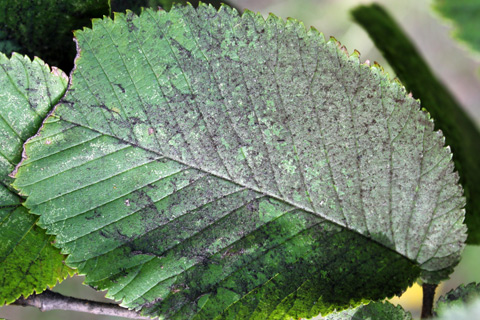
Keep Your Landscape and Home Aphid Free
With the ability to quickly multiply and infest your landscape, aphids can cause the decline and eventual death of your plants and trees.
In this article, we’ve answered common “aphid” questions, you’ve learned to identify an aphid infestation and take action. You now know how to use three effective control methods and how to attract beneficial insects to your landscape.
By not taking action against an aphid infestation, you are leaving your plants and trees vulnerable to other insect infestations and disease which can kill them even faster.
Sources:
https://www.pestworld.org/news-hub/pest-articles/six-steps-to-an-ant-free-home/
